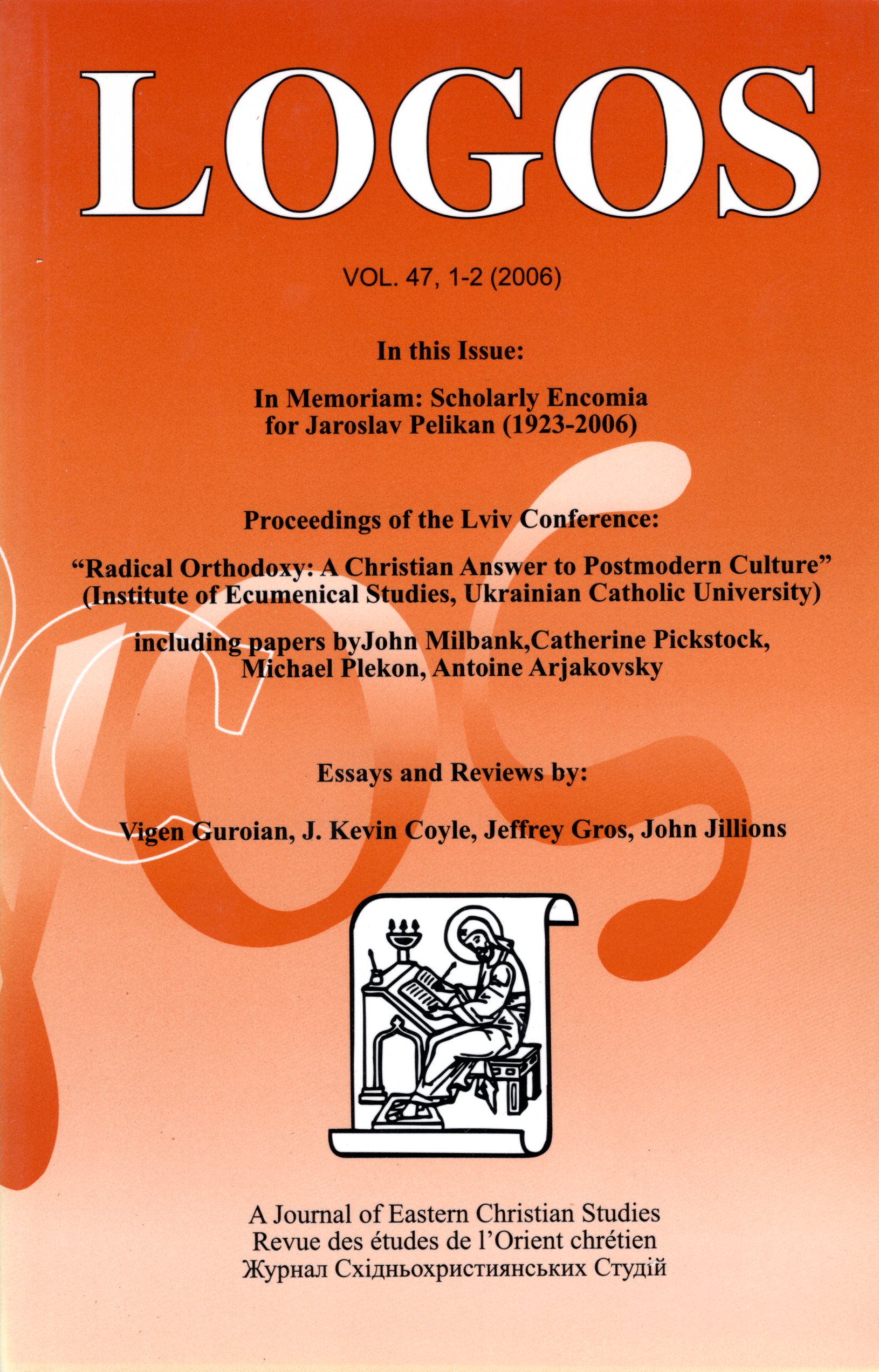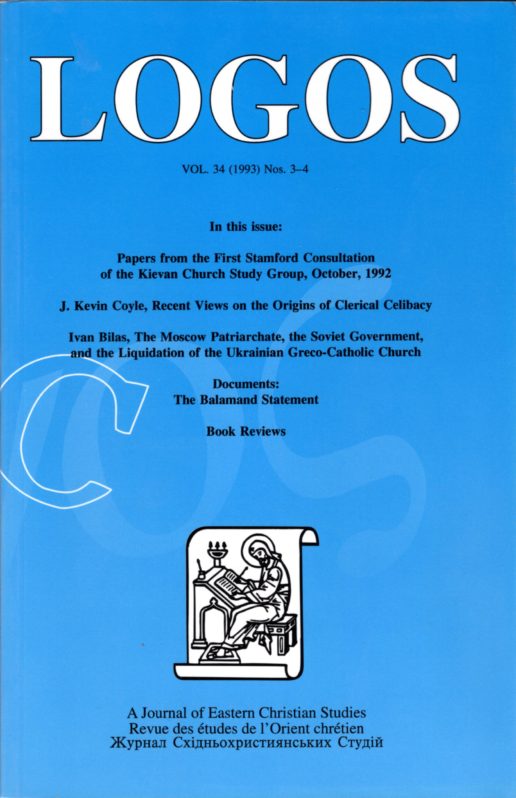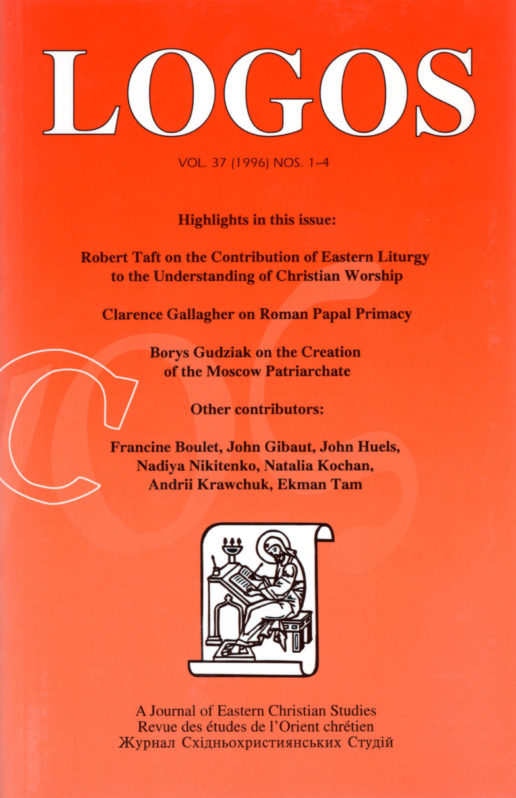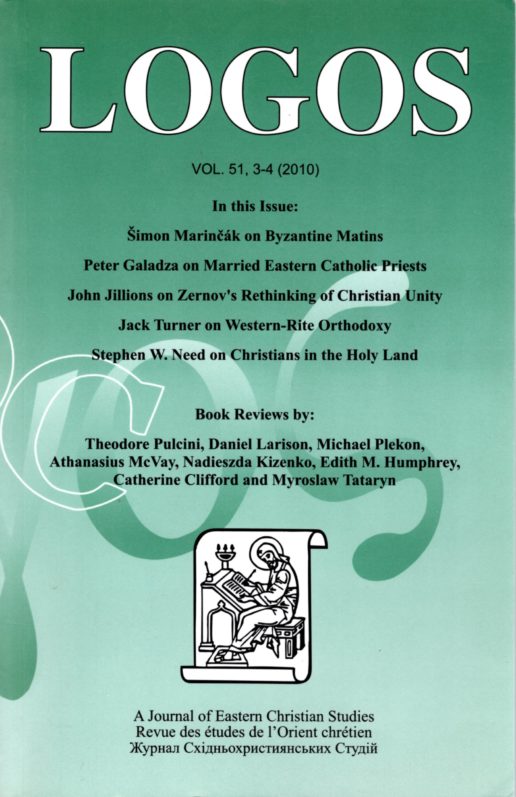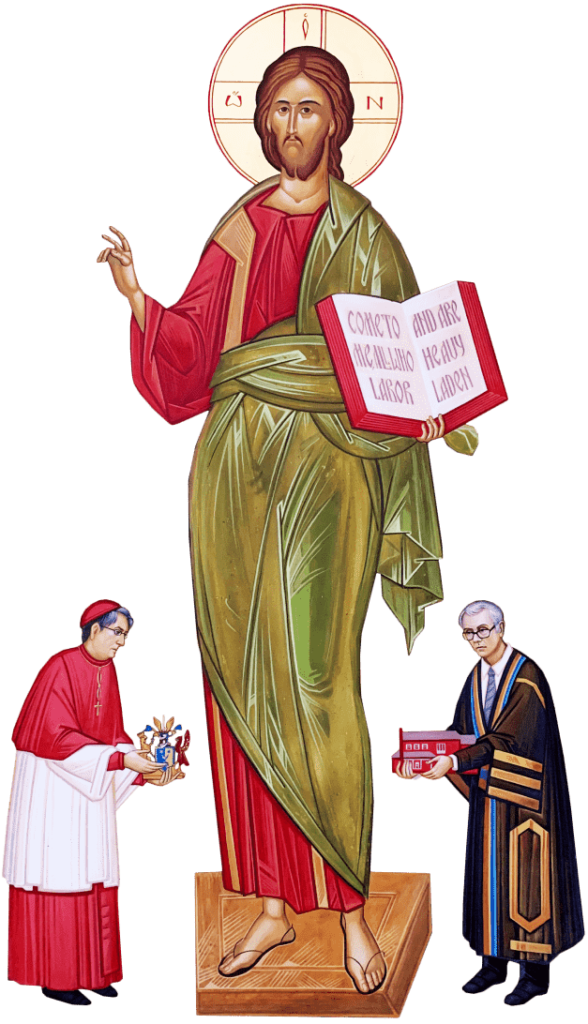Description
Table of Contents (PDF)
Editorial
† Jaroslav Pelikan (1923–2006) (1)
Some Milestones in Theological Education (5)
Proceedings from the Lviv conference “Radical Orthodoxy: A Christian Answer to Postmodern Culture”
Paul Against Biopolitics (PDF)
John Milbank (9)
Abstract
Amidst the “biopolitical paradoxes” (as analyzed by, inter alia, Carl Schmitt, Walter Benjamin, and Giorgio Agamben) of a world seemingly governed by liberal nation-states with their monopoly on power and the ability to unleash violence, the author argues that only Saint Paul takes us outside the order of the biopolitical. While classical antique notions of natural law, to which Paul appealed, do so to some degree, only Paul thinks outside the horizon of both antique and modern biopolitics. The key difference is that Paul thought natural justice not just in relation to life, but in relation to resurrection. Bruno Blumenfeld’s treatment of Paul is examined closely for its ecclesiological and eschatological insights. Milbank concludes that the counter-factual of resurrection alone permits us hopefully to imagine a politics that does not inevitably support regimes of abjection. Only the arrival of such a reality in time, however, provides for a restored ontology of undying life, and thereby renders possible the project of human social justice.
“Святий Павло проти біополітики”
Джон Мілбанк
Резюме
Посеред “біополітичних парадоксів” (які аналізують Карл Шміт, Уолтер Бенджамін та Джорджіо Агамбен) світу, яким явно керують країни, що володіють монополією на владу та здатністю до насильста, автор стверджує , що лише Святий Павло може вести нас поза межі біополітичного устрою. В той час як класичні античні поняття природнього закону , до якого апелює Святий Павло, роблять це ж до певної міри, та лише вчення Святого Павла виходить поза межі як античної так і сучасної біополітики. Ключова відмінність полягає в тому, що Святий Павло розглядав природню справедливість не лише у стосунку до життя, але у стосунку до воскресіння. Автор грунтовно розглядає вчення Бруно Бламенфілд про Павла, через його еклезіологічні та есхатологічні прогляди. Мілбенк робить висновок, що лише протиставлення самого воскресіння дає нам надію уявити політику, яка не обов’язково підтримує режими приниження. Проте, лише за умови приходу такої дійсності в часі стає можливе відновлення онтології безсмертного життя а з ним і проект людської соціальної справедливості.
Quasi Una Sonata: Postmodernism, Religion, and Music (PDF)
Catherine Pickstock (51)
Abstract
The relationship of music to religion is a complex and often ambivalent one. Even where obscured or ignored, religious faith can still be found, if obliquely, in modern music. The author reviews this relationship through analysis of musical theory as well as the works of such musicians as, inter alia, Wagner, Iannis Xenakis, Pierre Boulez, and especially Olivier Messiaen; and such philosophers and theologians as Augustine and Aquinas, Henri Bergson, Gilles Deleuze and Félix Guattari. The “ground of possibility” of music is examined in the works of still others, including Stravinsky, Schoenberg, Alfred Schnittke, Galina Ustvolskaya, Sophia Gubaidulina, and Avro Part. Attention is paid to more “technical” aspects of music and their philosophical or theological connotations, including the role of serialism in music, the use of glissando, spatialisation, retrogradability, the durée and, especially, the role of the “diagonal.” Pickstock concludes that in a musically and spiritually confused and often cacophonic age, there is nonetheless grounds for hope as music and faith are coming together again.
“Quasi una Sonata”
Кетрин Піксток
Резюме
Зв’язок між музикою та релігією є дуже складний та часто невизначений. Хоч і не виразно та ми віднаходимо віру, в сучасній музиці, навіть якщо її існування там не визнається або ж приховане. Автор розглядає цей зв’язок за допомогою аналізу музичної теорії та творів таких музикантів як Вагнер, Яніс Ксенакіс, П’єр Булі, та особливо Олів’є Месьєн та таких філософів та богословів як Августин та Тома Аквінський, Генрі Бергсон, Джільс Делез та Фелікс Гватарі. Можливості музики розглядаються також в творах інших авторів, таких як Стравінський, Шонберг, Альфред Шнітке, Галіна Уствольская, Софія Губайдуліна та Авро Парт. Автор приділяє увагу більш “технічним” аспектам музики та їх філософським та богословським значенням, включаючи роль серіалізму в музиці, використання glissando, спаціалізації, ретроградабильности, дюре та особливо, роль “діагоналу”. Піксток робить висновок, що в музично та духовно спантеличену та часто какофонічну епоху, все ж зароджується надія, коли музика та віра знову поєднуються.
Social Theory Working with Theology: The Case of Sergius Bulgakov as an Example of Living Tradition (PDF)
Michael Plekon (89)
Abstract
The author reviews the life and work of Sergius Bulgakov, tracing, firstly, the influences on Bulgakov (including such figures as Nicholas Berdiaev, Vladimir Soloviev, Nicholas Afanasiev, George Fedotov, Lev Zander, and Basil Zenkovsky) and then the influence of Bulgakov on other contemporary theologians, including Paul Evdokimov, Alexander Schmemann, John Meyendorff, Maria Skovtsova, Dimitri Klepinine, and Elisabeth Behr-Sigel. In addition, some contemporary scholarship on Bulgakov—by Antoine Arjakovsky, Rowan Williams, Paul Valliere, John Milbank and others—is mentioned. In a particular way, the author reviews Bulgakov’s work on eschatology, “living tradition,” “social ecclesiology,” the “humanity of God,” and the ongoing work of the Holy Spirit in a “permanent Pentecost.” The author concludes by mentioning the influence of the sociologist Peter L. Berger in trying, as Bulgakov did, to bring theology into dialogue with social theory.
“Соціальна теорія у співпраці з богослов’ям”
Майкл Плекон
Резюме
Автор робить огляд життя та творчості Сергія Булгакова, спершу він досліджує вплив на Булгакова (таких постатей як Ніколай Бердяєв, Володимир Соловйов, Ніколас Афанасьєв, Джордж Федотов, Лев Зандер та Василь Зенковский), а тоді, вплив самого Булгакова на інших богословів сучасників, таких як Павло Євдокімов, Олександр Шмеман, Іван Меєндорф, Марія Сковтцова, Димітрій Клепіні, та Елізабет Бер-Сігел. А також згадує про деякі сучасні дослідження творчості Булгакова таких авторів як Антуан Аржаковський, Роен Вільямс, Пол Валері. Джон Мілбанк та інших. Автор приділяє особливу увагу творам Булгакова на тему есхатології, “живої традиції”, “соціальної еклезіології”, “людськості Бога” та неперервної праці Святого Духа у “постійній П’ятидесятниці”. Автор завершує згадкою про вплив соціолога Пітера Л. Бергера в тому, що він як і Булгаков, намагався поєднати богослов’я з соціальною теорією.
Radical Orthodoxy, Eastern Christianity, and Liturgical Enactments of Economic Truth (PDF)
Peter Galadza (103)
Abstract
The author reviews the connections between Orthodox theology (especially as practiced by Alexander Schmemann, John Meyendorff, and Kallistos Ware), the theology of Radical Orthodoxy (especially as practiced by John Milbank, Graham Ward, Catherine Pickstock, and William Cavanaugh), and the economics of D. Stephen Long and Daniel M. Bell Jr. This review has as its goal a demonstration of the claim that “it is the church, uniting earth and heaven, which is the true ‘politics.’ And “[t]he earthly city is not a true res publica because there can be no justice and no common weal where God is not truly worshipped.” The implications of this claim for the liturgical and socioeconomic practices of the contemporary Church and world are examined.
“Радикальне православ’я, східне християнство та літургійні передумови економної правди.”
Петро Галадза
Резюме
Автор розглядає зв’язки між Православним богослов’ям (зокрема на прикладі Александра Шмемана, Джона Меєндорфа та Калістоса Вера), богослов’я Радикального Православ’я (зокрема на прикладі Джона Мілбанка, Грема Варда, Кетерин Піксток та Вільяма Кавана) та економіки Д.Стефана Лонг та Даніеля М. Бел молодшого. Цей огляд має на меті продемонструвати твердження, що “саме церква, яка поєднує небо і землю, є справжньою ‘політикою’. І “земний град не є справжньою res publica, бо не може бути справедливості та загального благополуччя там, де дійсно не прославляють Бога”. Тут розглядається саме підтекст цього твердження у літургійній та соціоекономічній практиках сучасної церкви та світу.
In Support of a Radical Definition of Orthodoxy (PDF)
Antoine Arjakovsky (143)
Abstract
The author attempts to understand historically and then expand the definition of “Orthodoxy” through a discussion of Orthodox historiography, Orthodoxy “historiosophy,” and Orthodox history, showing that in each case the more narrow “confessional” definition of Orthodoxy is not always clearly supported by the facts of history and is not true to Orthodox theology itself, which must be understood in a newly pragmatic and ecumenical way. Drawing on the thought of such as Jean-Marc Ferry, Alexander Schmemann, and Olivier Clément, Arjakovsky shows that Orthodox theology is not static and goes beyond the “orthodox” historical self-consciousness of a given era and even beyond the boundaries of the Orthodox Church. Orthodox identity is thus understood in a much more dynamic way as encompassing four periods and being expressed in four different modes: right glorification (eschatology), authentic faith (politics), true memory (confessionalism), and new life in Christ through the Spirit (sophiology). The author uses this four-fold schema to analyze the history and identity of the Ukrainian Greco-Catholic Church .
“На підтримку радикального визначення Православ’я”
Антуан Аржаковський
Резюме
Автор намагається збагнути історично, а тоді розширити визначення “Православ’я” через дослідження православної історіографії, православної “історіософії” та православної історії і показати, що в кожному з цих випадків вужче конфесійне визначення Православ’я не завжди підтверджується історичними фактами, а також не відповідає самому православному богослов’ю, яке слід розуміти в новий прагматичний та екуменічний спосіб.Опираючись на вченні таких мислителів як Жан-Марк Феррі, Александр Шмеман та Олів’є Клемент, Аржаковський показує, що православ’я не є статичне і виходить навіть поза межі Православної церкви.Тому, православну ідентичність слід розуміти в більш динамічний спосіб, який охоплює чотири періоди і виражений чотирма різними способами: правильне прославляння (есхатологія), справжня віра (політика), правдиві спогади (сповідництво) та нове життя в Христі через Духа (софіологія). Автор уживає цю чотиривимірну схему для того, щоб проаналізувати історію та ідентичність Української Греко-Католицької Церкви.
Graced Creatureliness: Ontological Tension in the Uncreated/Created. Distinction in the Sophiologies of Solov’ev, Bulgakov and Milbank (PDF)
Brandon Gallaher (163)
Abstract
The author reviews the sophiological thought of Vladimir Solov’ev, Sergii Bulgakov and John Milbank to suggest that there is congruence between the first two, as Orthodox theologians, and that of John Milbank, as founder and proponent of Radical Orthodoxy, insofar as all agree in rejecting any notion of nature that can be thought other than under the sign of grace. Milbank’s recent essay “Sophiology and Theurgy: the New Theological Horizon,” is discussed at length, and Milbanks’ indebtedness to to Solov’ev and Bulgakov is analyzed in depth. The history and problems of sophiology in the twentieth century are detailed, and a possible “Christological corrective” to some of them is offered.
“Благодатна сотворенність ”
Брендон Галлахер
Резюме
Автор розглядає софіологічне вчення Володимира Соловйова, Сергія Булгакова та Джона Мілбанка для того, щоб припустити існування подібності між першими двома як православними богословами а також і з Джоном Мілбанк який був засновником та ініціатором Радикального Православ’я, оскільки всі вони погоджуються в тому, що відкидають будь-яке поняття природи поза знаменням благодаті. Автор детально розглядає нещодавню статтю Мілбанка “Софіологія та теургія: новий богословський горизонт” та глибше аналізує те, чим саме Мілбанк завдячує Соловйову та Булгакову. Автор уважно переглядає історію та проблеми софіології в двадцятому столітті та подає можливі “Христологічні корективи” для деяких з них.
The Majdan vs. Utilitarianism: Reflecting on Emerging Moral Patterns in Ukraine (PDF)
Volodymyr Turchynovskyy (191)
Abstract
The author analyzes the moral underpinnings of the Orange Revolution in Ukraine to suggest that its participants were not motivated merely by a base consideration of individual socioeconomic or political welfare understood in utilitarian terms. Utilitarianism—as understood by Thomas Nagel, Peter Singer, John Stuart Mill, Charles Taylor, Friedrich Nietzsche, Max Scheler, and Pope John Paul II—is analyzed to demonstrate that what happened in the public square (the “majdan” ) in Kyiv in the Orange Revolution was not utilitarianism proper but rather a “geopolitical seismic shift” as Ukrainians, manifesting a new spiritual maturity, exercised their hard-won freedom to reject political corruption and to protest electoral fraud precisely by coming together as a community united by the higher values of love and self-sacrifice and a recognition that the transcendent dignity of the human person and the defense of human rights must be the foundation for a true culture of life.
“Майдан vs утилітаризм”
Володимир Турчиновський
Резюме
Автор аналізує моральні підвалини Помаранчевої революції в Україні, щоб довести, що її учасники мотивувались не просто жагою індивідуального суспільноекономічного чи політичного добробуту в утилітарному значенні. Автор аналізує утилітаризм у вченнях таких мислителів як Томас Нагель, Пітер Сінгер, Джон Стюарт Мілл, Чарльз Тейлор, Фрідріх Ніцше, Макс Шелер та папа Іван Павло ІІ для того, щоб показати, що те, що сталося на майдані в Києві під час Помаранчевої революції насправді не є утилітаризмом, а радше “сейсмічною зміною геополітичного масштабу”, коли українці, виявляючи нову духовну зрілість, скористались своєю багатовистражданою свободою, щоб відкинути політичну корупцію та опротестувати фальшиві вибори. Вони виступають як громада, яку об’єднують вищі цінності любові та самопожертви та визнання того, що трансцендентна гідність людської особи та захист людських прав повинні бути основою для справжньої культури життя.
Towards Comprehending the Post-Atheist Situation: The Memory of the Martyrs in Eschatological Perspective (PDF)
Konstantin Sigov (209)
Abstract
The author discusses the “radical orthography” and “political grammar” of the Soviet Union whereby the word “God” was only ever permitted in the lowercase: god. Sergey Averintsev’s article “Eschatology” in the Soviet Encyclopedia of Philosophy is reviewed to demonstrate such a “degradation of mysticism into politics” (Charles Péguy) . This ostensible dethroning of God was thought to elevate man and his social progress. The author reviews the tales of destruction and death inflicted on many Christian martyrs, beginning with the execution of Metropolitan Vladimir Bogoyavlenski of Kyiv in 1918. As the post-Soviet years continue to advance, the stories of such martyrdom are increasingly being forgotten, or never learned in the first place, by younger generations. Drawing on the thought of the late Metropolitan Anthony of Sourozh together with Alexander Glagolev, the author insists that martyrdom must always be understood as an eternally relevant act of love.
“В напрямку до розуміння пост-атеїстичної ситуації: спогади мучеників в есхатологічній перспективі”
Константін Сігов
Резюме
Автор обговорює “радикальну орфографію” та “політичну граматику” Радянського Союзу, де слово “Бог” дозволяли писати лише з малої літери. Він робить огляд статті Сергія Аверінцева “Есхатологія” в Радянській енциклопедії філософії, щоб показати наскільки відбулося “виродження містицизму в політику”(Чарльз Пеґі) Ця ніби-очевидна детронізація Бога мала на меті піднести людину та соціальний прогрес. Автор наводить перекази про винищення та смерть багатьох християнських мучеників, які розпочалися після вбивства Київського Митрополита Володимира Богоявленського у 1918 році. Що далі відходиться в пост-радянську епоху, завважує автор, що більше молоде покоління забуває такі історії мучеництва, якщо взагалі про них щось знає.Опираючись на вчення Митрополита Антонія Сурожського та Олександра Глаголєва, автор наполягає на тому, що мучеництво слід завжди розуміти як тривалий акт любові. Jean-Luc Marion’s Philosophy of the Gift and Postmodern Culture
Alexander Filonenko (219)
Jean-Luc Marion’s Philosophy of the Gift and Postmodern Culture (PDF)
Alexander Filonenko (219)
Abstract
The author suggests that Jean-Luc Marion’s concepts may create a common space for Christian witness in postmodern culture. Marion returns to the pre-modernist Christian heritage in order to actualize the claims of theological critics presented by modern philosophy for autonomy and to make it possible for theology to act as the mediation among all spheres of postmodernist culture (ontology, ethics, aesthetics, arts, politics, economics) in the context of Christian witness. The differences between Marion and Levinas are briefly discussed, as is the difference between an idol and icon, before the author concludes with a discussion of eucharistic hermeneutics.
“Філософія дару Жан-Люка Маріона та постмодерна культура”
Олександр Філоненко
Резюме
Автор робить припущення, що концепції Жан-Люка Маріона можуть стати підгрунтям для християнського свідчення в постмодерній культурі. Маріон звертається до передмодерної християнської спадщини, щоб актуалізувати вимоги богословських критиків, які подає сучасна філософія щодо автономії і для того, щоб богослов’я змоглo діяти як посередник в усіх сферах постмодерної культури (онтології, етики, естетики, мистецтва, політики, економіки) в контексті християнського свідчення. Автор також робить короткий огляд відмінностей між Маріоном та Левінасом, між ідолом та іконою, а на завершення автор розглядає євхаристійну герменевтику.
The Forgiveness of Martyrs: the Seeds of Unity (PDF)
Didier Rance (229)
Abstract
The author reviews recent ecumenical commemorations of the Christians martyred in the 20 th century and then attempts to suggest that John Milbank’s Being Reconciled could provide intellectual resources for Christians seeking to offer and receive forgiveness. The author suggests that a powerful sign of Christian reconciliation would be the common commemoration of those killed by their fellow Christians and counted as martyrs by their communities, e.g., Saints Josaphat Kuntsevych of Polotsk and Athanasius Philipovich of Brest.
“Прощення мучеників: зерна єдності”
Дідьє Ренс
Резюме
Автор розглядає нещодавні екуменічні поминання християнських мучеників ХХ-го століття, а тоді пробує припустити, що праця Джона Мілбанка Будучи примиреними могла б стати інтелектуальним джерелом для християн, які шукають і отримують прощення. Автор припускає, що потужний знак християнського примирення міг би стати спільним поминанням тих, які були замордовані своїми братами християнами та вважаються мучениками у власній спільноті, нпр. святі Йосафат Кунцевич та Атанасій Филипович.
The Promotion of Personhood in France (PDF)
Thierry de Roucy (237)
Abstract
The author argues that one of the greatest tasks of the Church today is the development and defense of a robust Christian anthropology against the depersonalization taking place under the onslaught of a secularism which, ironically, seeks to deny God and elevate man, but actually ends up denigrating man and his dignity. The author, the founder of the French community Points-Cœur (Heart’s Home) whose charisms include fatherhood, mission, and compassion, demonstrates how the defense of human dignity can take place in and by such communities as his, one of the so-called new ecclesial movements which contribute not merely to the renewal of the Church but also to the renewal and even reconstruction of the human personality.
“Возвеличення людини у Франції”
Тьєрі де Русі
Резюме
Автор стверджує, що одне з найбільших завдань церкви сьогодні полягає в тому, щоб розвивати та захищати міцну християнську антропологію від деперсоналізації, яка відбувається під впливом шаленої атаки секуляризму, який як не іронічно намагається заперечити Бога та вивищити людину, а врешті решт принижує людину та її гідність. Автор, засновник французької спільноти Points-Cœur (Оселя Серця), харизми якої включають: вітцівство, місійність, та співчуття показує, як можуть захищати людську гідність такі спільноти як його, один з так званих еклезіологічних рухів, які сприяють не просто оновленню Церкви, а також оновленню та навіть перебудові людської особистості.
The Metaphysics of Emmanuel Levinas in the Postmodern Context (PDF)
Epiphanii Hnativ (257)
Abstract
The author suggests that the depersonalization of man in the postmodern context together with the rise in violence is symptomatic of a philosophical struggle between the ontology of war and the eschatology of peace. The contributions of Hegel, Husserl, and Heidegger to this struggle are briefly reviewed before a suggestion is offered that the radical character of the ethical metaphysics of Levinas will provide a way forward.
“Метафізика Емануеля Левінаса в постмодерному контексті”
Епіфаніі Гнатів
Резюме
Автор припускає, що деперсоналізація людини в постмодерному контексті поряд із зростанням жорстокості є симптомом філософської боротьби між онтологією війни та есхатологією миру. Автор робить короткий огляд того, що привнесла філософія Гегеля, Гассерла та Гейдегера в цю боротьбу, а на завершення припускає, що саме радикальний характер етичної метафізики Левінаса дасть можливість рухатися вперед.
Andrey Sheptytsky, the Ukrainian Catholic Church, and Radical Orthodoxy (PDF)
Iwan Dacko (265)
Abstract
The author attempts to suggest that Metropolitan Andrew Sheptytsky (1865-1944) was a pioneer of the Radical Orthodoxy movement of the late 20 th and early 21 st centuries, especially in Sheptytsky’s attention to the Fathers of the Church and the celebration of the liturgy.
“Андрей Шептицький, східні християнські церкви та радикальне православ’я”
Іван Дацько
Резюме
Автор доводить, що Митрополит Андрей Шептицький (1865-1944) був піонером руху Радикального Православ’я наприкінці XX-го та початку XXI-го століття, особливо, коли йдеться про захоплення Шептицького Отцями Церкви та відправою Літургії.
Interpretation of the Word in Liturgical Books and the Problems of Postmodern Philosophy (PDF)
Natalia Syrotynska (279)
Abstract
The author attempts to argue that the patrimony of Byzantine liturgical chant, grounded in the Octoich as well as various irmologia, is built on a system of eight modes (cyclic time) that intersects with the linear time of the calendar, creating a “dual time standard” between cyclic and linear, between moveable and immovable feasts and commemorations. The connections between such cycles and patterns, on the one hand, and human consciousness of time, on the other, are briefly discussed.
“Інтерпритація слова в літургічних книгах та проблеми постмодерної філософії”
Наталя Сиротинська
Резюме
Автор пробує довести , що спадщина візантійського літургійного співу, яку віднаходимо в Октоїху та різних ірмологіонах базується на вісьмох тональностях (циклічний час) який перетинається з лінійним часом календаря, створюючи “подвійний часовий стандарт” між циклічним та лінійним, між рухомими та нерухомими святами та празниками. Автор коротко обговорює з одного боку зв’язок між такими циклами та моделями, а з іншого людське усвідомлення часу.
Notes, Essays, Lectures
Presentation of the Publishing House Parole et Silence (PDF open access article)
Sabine Larivé (291)
Radical Orthodoxy: a Christian Response to Post-Modern Culture
Andryi Horak (299)
Alternatives to the Secularization of Contemporary Society: Suggestions from the Ukrainian Churches (PDF sample)
Marian Buczek (303)
Alternatives to Secularization in the Christian Churches (PDF sample)
Ihor Vozniak (305)
A Welcoming Word
Ivan Jurkovic (309)
Review Essays
Mary Among the Catholics and Anglicans: an Orthodox Response (PDF sample)
John A. Jillions (313)
The Achievements of Vigen Guroian (PDF sample)
Adam DeVille (320)
Book Reviews
Jaroslav Pelikan, Acts (Brazos Theological Commentary on the Bible Series, Volume 1)
John Jillions (333)
Valerie Hotchkiss and Patrick Henry, eds., Orthodoxy And Western Culture: A Collection of Essays Honoring Jaroslav Pelikan on His Eightieth Birthday
Vigen Guroian (340)
John Moorhead, Gregory the Great (The Early Church Fathers)
J. Kevin Coyle (344)
D. Donnelly, A.Denauz, J.Fameré, eds., The Holy Spirit, the Church, and Christian Unity
Jeffrey Gros, FSC (348)
Briefly Noted (351)
Books Received (361)
Contributors (373)
Language: English, Ukrainian
Softcover: vi, 400 pages
Publisher: The Metropolitan Sheptytsky Institute of Eastern Christian Studies
ISSN: 0024-5895
Digital File: $15
Size: 2 MB
A link to the PDF file of this title will be sent to you. The PDF file is for your personal use only. You may not copy, share, publish, or sell the file. Protected by copyright of the Metropolitan Andrey Sheptytsky Institute of Eastern Christian Studies.

